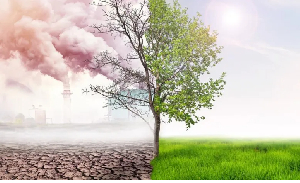 An image depicting climate change
An image depicting climate change
Ghana, like many nations, finds itself at the crossroads of a climate crisis that threatens its future stability and prosperity. The impacts of climate change are no longer distant concerns but present realities, shaping every aspect of life in the country. From unpredictable weather patterns to the rising risks of droughts, flooding, and food insecurity, the climate emergency in Ghana demands urgent attention. This article aims to provide an overview of the country's climate change challenges, setting the stage for a deeper exploration of the environmental battle ahead and some strategies to overcome this issue.
Climate change is having a profound effect on Ghana's environment, with noticeable changes in weather patterns that affect both urban and rural communities. One of the most significant impacts is the increasing frequency and intensity of extreme weather events, such as floods and droughts. These changes disrupt agricultural production, which is vital for the livelihoods of many Ghanaians, especially those in rural areas. According to the Ghana Environmental Protection Agency (EPA), the country has seen a rise in annual temperatures, which exacerbates drought conditions, reduces water availability, and affects crop yields (EPA, 2023).
Furthermore, the rising sea levels, partly due to global warming, are threatening coastal cities like Accra, which face flooding during heavy rains and erosion from rising tides. The effects of these environmental changes are not limited to the environment alone but extend to the economy and public health, further highlighting the urgent need for comprehensive climate action.
Ghana faces several environmental challenges that have been worsened by climate change. Deforestation is one of the leading issues, as the demand for timber and agricultural land drives illegal logging and land degradation. The Food and Agriculture Organization (FAO) reports that Ghana loses approximately 2.19% of its forest cover each year, which increases soil erosion, reduces biodiversity, and contributes to the nation’s vulnerability to climate impacts (FAO, 2022).
Additionally, water scarcity has become a major concern as changing rainfall patterns affect the availability of clean water for both consumption and agriculture. The World Bank notes that by 2030, Ghana may experience a significant decline in water resources, which will affect millions of people and hinder the nation’s development efforts (World Bank, 2024). Addressing these environmental challenges requires immediate, coordinated action at all levels of government and society.
Dr. Yaw Agyeman Boafo, a climate change expert at the Centre for Climate Change and Sustainability Studies at the University of Ghana, highlighted several urgent signs of climate change in Ghana. He noted that rising temperatures are affecting both rural and urban areas, impacting health, economic well-being, and agriculture. Prolonged droughts, especially in Northern Ghana, are harming farming communities that rely on rainfall, while irregular rainfall patterns make it harder for farmers to produce enough for both personal consumption and sale. Additionally, even short periods of heavy rainfall are causing flooding, which, although partly due to human factors, is increased by climate change.
In terms of preparing for long-term climate impacts, Dr. Boafo emphasized the need for both adaptation and mitigation strategies. He suggested that Ghana should invest in climate-resilient infrastructure across various sectors, including agriculture, health, and business. Nature-based solutions, such as tree planting and agroforestry, were highlighted as essential steps toward addressing environmental degradation, and water scarcity, and improving the overall ecosystem. He also stressed the importance of ensuring that economic activities restore degraded lands while benefiting both people and the environment.
The climate emergency in Ghana is not a distant threat, it is an ongoing challenge that demands immediate and sustained action. From rising temperatures and erratic rainfall to the growing threats of droughts and flooding, the impacts of climate change are already being felt across the country.
Addressing these challenges requires a multifaceted approach, focusing on both adaptation and mitigation strategies. By investing in climate-resilient infrastructure, promoting nature-based solutions, and protecting vital ecosystems, Ghana can safeguard its future and ensure the well-being of its people. The time to act is now, and the responsibility lies with both government and citizens to confront the environmental battle ahead with urgency and determination.